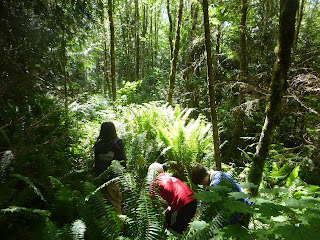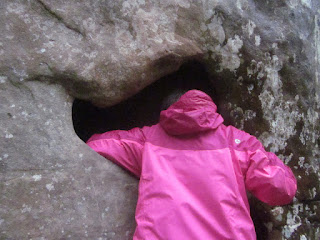Let’s start at the finish. Before boarding the bus to return from our outing to Point Whitehorn on Saturday, Mentor Brian asked the quite chilled Jumping Mice to form a circle, except for two boys who’d been taken aside and given the following instruction — “Your job is to try to get into the circle.” The circled boys were told that the two boys had been told that their job was to try to get into the circle. The activity began.
The two “outliers” approached the circle somewhat aggressively, trying to find weak points at which to penetrate the circle. Meanwhile, the circled boys locked arms, bracing for the attack. About 30 seconds later, one of the “outliers” was in the middle; the other was still struggling to gain access. At that point, the mentors stopped the activity.
When the boys had disentangled, Mentor Brian asked a simple question of the outliers — “Is there a reason why you didn’t just ask to be allowed to join the circle?” And the corresponding question was directed to the circled boys, “Is there a reason you didn’t invite them in?”
This activity goes to the heart of one of the things we’re working on with the Jumping Mice - focusing on and attending to others. According to an Explorers Club motto, “We work on widening our circle of connection with others, focusing on including others and mixing up our known circle to connect with all. In this way, groups often form a special kind of kinship over time.” (Motto - Widen the circle)
In my view, that kinship has yet to form for the Jumping Mice. There are friendships, to be sure, but the group identity that would compel Explorers to put aside their desire to horse around in favor of supporting fellow Jumping Mice in the construction of a driftwood shelter (our task for the day) simply wasn’t there. Neither was the individual focus mentors look for as a sign that Explorers are ready for bigger things such as carving (which they’ve begun to request).
There are indications we’re getting close. Earlier in the outing, we tried another team focused activity (Helium stick) in which all the Jumping Mice had to lower a stick, which was resting on one outstretched finger from each Explorer, to the ground without any finger losing contact with the stick. This is much harder than my description would indicate, but the Jumping Mice nailed it first try. I’ve seen this activity done a few times and never have I seen a group succeed the first time they do it.
Mentor Glen and I saw also moments of curiosity and concern for other individuals on the outing. And we should write off some of their distraction to the natural playground that is Point Whitehorn and to the cool, wet weather (check out how dark the pictures are!). Whereas I’m grateful for the life-giving rain, I will also attest to the penetrating cold and wet we felt on Saturday. As I imagine you realize, it makes everything a bit more challenging.
And speaking of challenging, our next outing offers another opportunity for team effort. We’ll traverse from the Clayton Beach parking lot to the Larrabee boat launch. Lots of forest and beach hiking and a rascally tide with which to contend. Here are the rest of the photos from our Point Whitehorn exploration.






































